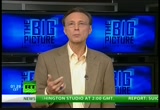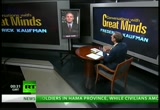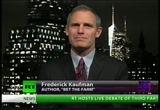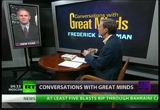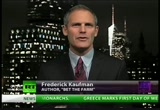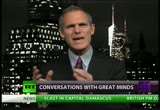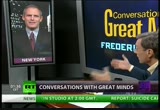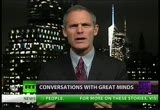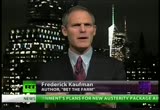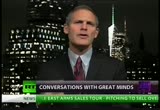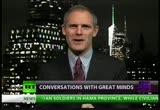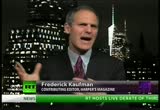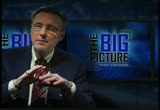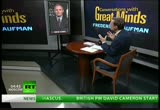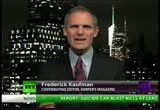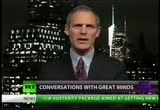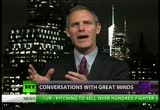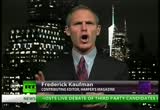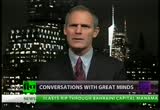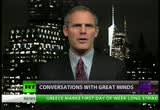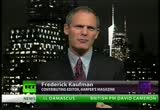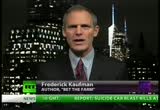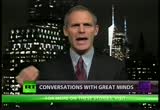tv [untitled] November 5, 2012 7:30pm-8:00pm EST
7:30 pm
yorker foreign policy the new york times magazine and many others have spoken about food culture at the united nations that has appeared on n.b.c.'s n.b.c. democracy now n.p.r. and the b.b.c. world service in our conversation we talked about the role the banks play in controlling global food prices and how that has helped to cause the global malnutrition and hunger epidemics that we're seeing today we also discussed how india and china are ahead of the united states when it comes to combating hunger and preparing for famine and now my conversation with writer cough. for tonight's conversations of great minds i'm joined by frederick kauffman frederick is a contributing editor harper's professor at the city university of new york's graduate school of journalism he's written about american food culture and other subjects for a variety of publications including the new yorker foreign policy new york times
7:31 pm
magazine and many others frederick has spoken about food culture of the united nations has appeared on n.b.c.'s n.b.c. democracy now n.p.r. and b.b.c. he's also the author of the critically acclaimed book bet the farm how food stopped being food frederick joins me now from our new york studios fredrick welcome hi tom how are you i'm fine great to have you with us your book bet the farm is filled with stories as well as information about you know we do see in this conference are going what what got you into this. well i'm a journalist and i had been really following the food story for quite some time and i thought i had a pretty simple question after all these articles which was how could an expanse of delicious and healthy food be available for everybody on earth and i thought i had a pretty simple answer tom i thought it was takeout pizza and. i am joking yes but i i thought maybe
7:32 pm
a little tongue in cheek i should look at takeout pizza because actually tom takeout pizza is a thirty six billion dollar industry people all over the world eat pizza and love pizza and russia and malaysia and so i thought maybe if i start here this is going to lead me on my path to figuring out why actually there are almost a billion hungry people on earth and and that's how i started off i started off at domino's pizza at their corporate headquarters and what did you learn there. well i learned that the industrial food system that we've all heard so much about actually is answering to much larger and more sinister forces out there in other words we all understand the industrialization of the food system of mcdonald's of of unilever of tyson foods but really there's something else going on now with food there's been a transformation of that in drug industrialized system into
7:33 pm
a securitized system or what i call financial lives to food and this is how wall street has become deeply involved and deeply embedded in the global food system so this goes way beyond the perhaps head scratching or shock that somebody might experience if they if they thought that eating at a taco bell and in a burger king were two completely different restaurants when in fact they're both on the same company the other is the the monopolization of the food market this year suggesting that the. mooted industry. are all the way down to the level of seeds and farming you know from the finished food that it's really become something that's been taken over by the banks tears well i think what happened here is that we had this massive financial crisis and meltdown in two thousand and eight and the world in many ways is still reeling and trying to recover and figure out the new normal after then at this point many of the people on wall street had
7:34 pm
a real problem which is that they were actually holding a lot of cash where are we going to put it we can no longer put it in real estate we can no longer put it in equities everything is going down the debt markets are no good even currencies themselves are not that trustworthy dollars and euros are both going down and so little will change scratching what is going to hold value going forward and the answer came to them well it is fresh water arable land and food and in fact there had been created a number of rather fancy financial instruments derivatives based on the value of food and hundreds of billions of dollars poured into this sector and really up ended the entire system and this is a relatively recent phenomena but you point out in the book that much of this started back in this financial ization food started back in one thousand nine hundred nine with goldman sachs. yes actually in ninety one
7:35 pm
goldman you know these they're very savvy and they perceived that going forward there might be a good use for this kind of financial derivative and so they created the goldman sachs commodity indexes it's not only goldman it's barclays is deeply into this deutsche bank all the largest banks in the world have perceived where the value is going to lie and so this is not this financial instrument actually went counter to the entire purposes of the commodity markets commodity markets are are those markets which worked well for more than one hundred years particularly in this country stabilizing the price of food these financial derivatives were based on the commodity markets but actually have had a tremendously destabilizing effect both causing bubbles market manipulation and tremendous volatility hurting both the industry and the consumer and actually anybody involved in the food business except the bankers and the traders have the
7:36 pm
commodity markets correct me if i'm wrong were originally created because farmers were routinely going bust in the in the early one thousand nine hundred and and and bakers people who used to farm products were going bust when they were cycles and in drought and things like this and so with the with the futures market a commodities market a farmer can say ok i'm a plant wheat and the day i planted i'm going to sell half my crop at a fixed price and whether it grows or not so i nominate have at least enough income that i'm not going to but we're broke this year and on the other side the bakery could say ok we're going to we're going to contract to buy a certain amount of wheat and you know we don't matter how the crop is we're going to get first call on that wheat so we know we can sell a certain number of loaves of bread this year and everybody was protected that was the theory right and that's that's a beautiful explanation and there was a balance there was a balance between the farmer and the baker a balance between who was buying and who was selling and this that these are these are extraordinary extraordinary markets that sure. no mercantile exchange the
7:37 pm
minneapolis grain exchange the kansas board of trade these are really extraordinary things that men and women had created over the years now to protect his omes yet to protect it precisely and to discover the price of a real sixty pound bushel of wheat but what happens when all this new money poured in in this post two thousand and eight period they really upset the workings of this market there used to be this delicate balance now the speculators are outnumbering what are called the bonafide hedgers those are the bakers and the farmers the speculators are are overwhelming them for want this point to home and and also the the orders to buy wheat the promises to buy wheat are overwhelming the hedging in the wheat and so there is a tremendous without getting too down into the the granules here tremendous demand shock every time these contracts come up and there's a huge pull of hundreds of billions of dollars and upward pull in the futures
7:38 pm
market and what which drives up prices exactly it drives up right now in this country we still have not quite gotten the quote unquote price signal yes there were food riots in paul ryan's home state in two thousand and eight in in milwaukee yes we have more people on food stamps than ever and yes in two thousand and eight trader joe's said you could only buy one bag of rice so we felt it a little bit but we're still only paying about ten to twelve percent of our weekly paycheck on food however commodities are globally traded there globally price in dollars and so let's look at a country like egypt which happens to be the world's number one importer of wheat so when the price of global wheat tripled from two thousand and two to two thousand and two two thousand and twelve which it has done in the past ten years as a consequence not of a scarcity of wheat but of the banks. yeah i mean let's remember that in two
7:39 pm
thousand and eight the first greatest price spike in the twenty first century that was the year of the greatest wheat harvest in the history of in the history of wheat harvest of the pressure and we call it precisely the price should have gone down and yet george soros themselves called it a bubble when not only the price of wheat but the price of oil hit one hundred forty seven dollars that what i'm trying to get at here is that in egypt all of a sudden instead of paying ten to twelve percent of our weekly paycheck as we do here they started paying forty percent imagine tom forty percent of your weekly paycheck on food that's the unrest that's the cause of the unrest of the arab spring now all the hedge fund guys i'm talking to all the managers who are informing me everybody is predicting that the price of wheat is going to double again easily in the next ten years that's going to make the arab spring look like a pep rally and we are no longer isolated we are not living in some sort of isolated america anymore these things are going to affect us we have to stop this
7:40 pm
rampant speculation in the wheat markets and in fact it wasn't just the arab spring i mean there were food riots in bangladesh there were food riots in parts of africa there were. in central or the sixty more than sixty food riots around the regime change around the world yeah i mean as a consequence of the banks speculating on food yeah that's right what we're seeing look what is the best way to cause social unrest in a country you know what is the cia trying to do in iran right now what they're trying to do is is force food inflation or if they're not going to try and they're actually doing it yet precisely because when when are you and i going to take to the streets i think maybe i might finally take to the street when a quart of milk costs twenty bucks and a pound of hamburger meat costs forty bucks then i'm getting very angry then we can no longer feed our families then we say this regime is not working and it's got to go and. so hard to to what extent. is are these guys these banks are making money on starvation around the world i mean this isn't
7:41 pm
just about making money off fat happy americans. no i think that these index funds these newfangled food derivatives i don't think that the that the investment bankers and the hedge fund managers and the sovereign wealth managers i don't think they were even a way heir of what would happen when people can invest in the price of food and they want to see that line go up and up and up they were not really hooked into the idea that each time each uptick we have another million children going into food insecurity and starvation they had that there is there's no sense of the larger consequence of what they're doing is that they're just sort of playing a video game with digital numbers as opposed to real food real wheat that can actually feed real people and when the price doubles you're driving people into a state where they no longer can afford it amazing and probably right now watching this you've got day trader sitting around gone she had better get in a week futures yet well of course it's not only that but the water is going to be
7:42 pm
an upcoming globally traded commodity hopefully we can stop this before it starts but all the traders i talk to say they know this they understand this they're aware of this because what they're doing is making a tremendous amount of money on the technicalities of what goes on with these financial derivatives each time the contracts come up you know tom there are no laws there are no laws against insider trading in wheat waho no laws against insider trading so hard to store it in an offside position doesn't go to jail it's it's it's happening that in a way yeah that's the way they do their business and so these guys are making they're making a killing right now they're making a killing off hunger amazing more conversations with great minds of further kaufman right after this but.
7:43 pm
i will write. that. i also promised that i'd fight every single day from every murder you. write of my own place. you know sometimes you see a story and it seems so for lengthly you think you understand it and then you glimpse something else you hear or see some other part of it and realize everything you thought you knew you don't know i'm tom harpur welcome to the big picture. here is mitt romney trying to figure out the name of that thing that we americans
7:44 pm
call a donor. i'm sorry i'm just a guy who cares an awful lot about my country music stars are you know what kind of my terrorist cells in your neighborhood all want the usa to feature is on the on the liberal and the christian point just because you're really going to. grow the corporate media distracts us from what you and i should care about because they're profit driven industry that sells a sensational stick garbage he calls it breaking news i'm abby martin and we're going to break that. part about your conversations with great minds with frederick kaufman has written
7:45 pm
about american. food culture and other subjects for a variety of publications including the new yorker foreign policy the york times magazine and many others he's also the author of the critically acclaimed book bet the farm food stopped being food let's get back to it just a few minutes ago you said that it's not illegal for there to be insider trading in commodity markets how can you have a a marketplace where people are basically betting against each other and even worse i mean this isn't about the price i pads this is this is this is a betting process that is actually causing people to die of starvation in some countries that's destabilizing countries you know the it has to do with food prices and availability around the world how is it that it's not illegal for there to be people manipulating these markets i was absolutely shocked to learn the level of no regulation in these markets and also the level of how much do you regulation it
7:46 pm
completely stripped these markets of any protection against bad players just yesterday i was watching the grain prices in india and everybody scratching their heads everybody why in india when we have a surplus of grain in india is the price going up and up up and. the next day what happens india sells seven million tons of grain to iran all right so clearly the traders the international week traders the people in commodities know that this trade is coming up and so that's why the price of wheat is going up and up and what's so fascinating here is that iran now because of the human the sanctions against it is actually using wheat as a backfire against wall street what they're doing is they're using wheat as cash they're getting around that they're getting around all the sanctions by trading oil
7:47 pm
for wheat holding that wheat hoarding that wheat and sending the price even higher so what we have is this insider trading actually backfiring against the western countries because of these because this complete lack of regulation it's a really terrible irony when did this was there a time when it was illegal to game the commodities futures there or the commodities markets and if so when did that change this haven't you with phil gramm in the commodity futures modernization act or is this well before that they go it goes even further back you know f.d.r. in his agriculture what he said is the bankers have to be pushed out of the food markets and what he did is he set speculative what are called positional limits in other words you cannot go endlessly long long food if you're a bank right there's a limit to how many you can take in the future it was done like thirty five and this this actually had a very nice effect and it went all the way through into the late ninety's when
7:48 pm
position limit exemptions were secretly given to eight of the largest financial institutions in this country the doors secretly had been open secret why did this well by actually it's a very difficult little path to follow but what happened was letters were sent to actually real. middle managers at the commodities futures trading commission it was not a top down decision this came from the middle and they were very very complicated letters asking for particular exemptions equating global trade and currencies to global trade global trade ingrain the idea being that somehow if you're trading in currency that's the same thing is trading in grain because grain is just another could have just had studies people seen what happened to like thailand and you know when when when the global trading currency george soros made a fortune on this thing among others you know just just crashed that country i was
7:49 pm
there when the the cranes were stopped things were rusty and buildings were half built for your commie fell apart because they were trading in currencies in this highly speculative way tom you know you you're talking about reason about what happened you know this is what he had every year because there was a mania you know there's reason on the one side and there was mania on the other side and there was almost as if we could characterize this in the one nine hundred ninety s. as a mania of deregulation so he was drawn to that the market god would somehow simply take care of us in iraq us all to sleep how absurd markets are created by people we need to regulate these markets that's how they work best but that market god was being promoted by alan greenspan with regard to the banking industry as chairman of the fed in fact he made a call about that before congress after the crash it was promoted by the cato foundation all the libertarian think tanks many of the republican you know
7:50 pm
a lot of democrats bought into a bill clinton global free trade all of bill clinton fell in love with this and the truth is that and this is something that it's kind of a touchy subject particularly when it comes to paul krugman perspective on this which is that quantitative easing is is really not helping glow the price of global grain printing trillions of dollars trillions of new dollar. is when grain is priced in dollars is going to send those that price up sure and so that's been problematic that's been problematic even as the currencies themselves are racing towards the bottom the grain is evermore going upwards so and so that has not helped people are still people are still trying to kind of figure their way out of the problem that was so are you suggesting in another that what brought this about was the promotion of an ideology and the you know the these these libertarian think tank that kind of thing or was it actually a couple of people who thought hey let's us it was thing was it somebody you know
7:51 pm
that ken lay of food or was it ken lay himself i mean you know his wife wendy was on the board of enron and she was you know the one that was pushing phil gramm to do the commodity futures modernization act and gramm wage blyleven deregulated the banks years and much of the commodity markets look at. gary cohn the president of goldman sachs testified to congress and he said he said he literally said there is no natural long in grain no natural long in oil what did he mean by this what he meant is that is that it wasn't possible for his bank to invest in necessary commodities like food the way you and i might invest in apple stock or general electric or something like that in others we might have bought it if we were lucky in one thousand nine hundred four and that we just hold it for thirty years but there's you can't do that with great well for obvious reasons there's a you should hold grain for thirty years but what they manipulated what they were able to do with the commodity index is a is they were able to say ok if we go take
7:52 pm
a derivative and then once removed from the derivative another derivative and we call it an index and we index all of the commodities together you can buy shares in that index and you can hold them for forever and it was in this way that they enticed hundreds of billions of new dollars into the grain sector that had never been there before. war and they equal abraded the market the markets are now completely asymmetrical and the markets are no longer performing their function of price discovery they're no longer even even even mirroring supply and demand is this the same thing that happened in the house with the housing market again pose gramley fly away and post commodity futures modernization act that the housing market went nuts because there was there was no flywheel in there what you what you have is is what i call it in my book the bubble business you have bubbles and volatility all through the sectors but of course houses are one thing right debt
7:53 pm
and risk is another thing and food seems to be a thing and to itself there's something particularly sad but i worry about food yeah there's been something special about food mom so moving along genetically modified corn monsanto genetically modified rice what how does the g.m.o. business fit into all this well as i was on the trail of trying to figure out why almost a billion people are hungry on earth i heard a lot of murmurings from scientific institutions genetically modified organisms can help feed the world and so i said all right let's take a look at it and i spent about a year traveling from one genetic modification laboratory to another i found one woman whose life's goal was to create the square tomato so that you could get more in the box i met another woman dr pamela ronald out at u.c. davis she had actually created a rice through the methods of genetic alteration that was resistant to the number
7:54 pm
one asian rice blight something called xanth ammonia is a potentially. hunger saving rice now those are two very different things a square tomato and a blight resistant rice i think that we have to be careful when we lump all science together in one barrel and throw it out i i am totally against the monopolistic and really really evil practices among santo and pioneer and syngenta and dow agro science but i am not so sure that labeling is the way to stop them i am all for transparency however i think the way to stop these guys from their monopolistic practices is to just take the money out of it we need to reform the intellectual property laws as they relate to plant patents the plant patent act dates back to the one nine hundred thirty tom i think it needs a little updating wouldn't wouldn't force from the sherman antitrust act to be
7:55 pm
useful too. i think that would also help i think i think the antitrust i think you see there are two things going on here well actually more than two things there are food becomes a legal construct such as intellectual property laws and that needs to be reformed on the industrial level we have monopolistic practices and that needs to be busted and on the financial level we have securitization and global financial ization and that needs to be regulated we really need that three pronged approach to try to get some sanity back to this right and this is here in the united states or worldwide i understand from from your book that india and china have something the united states doesn't right i think that will one of the india and china have they have a string of national strategic grain reserve i don't think anybody in this country would ever say we should get rid of our national strategic petroleum reserve we used to have a national strategic grain reserve got rid of it in our mania of deregulation in
7:56 pm
the late one nine hundred ninety s. that grain reserve helps stabilize prices this year after the drought after last summer's drought in the american midwest for the first time in a very very long time first time in my memory the demand for wheat in this country is going to outstrip the supply it might have been a good idea to have kept some grain in reserve and not leave that reserve in the hands of transnational corporations like cargill and a.t.m. who are very good at hoarding wheat and waiting and only selling until the price of becomes unconscionably high. how does buying local help save the world we just have third i think that yeah i think that we understand that the local system is that that slow food that local food all of this actually is going to be the ultimate solution for agro ecological that are positive relationships between farms and urban environments but we really can't get there until we get beyond this huge
7:57 pm
barrier of food fine. industrialized monopolised sure we can make our choices our consumer choices and that's going to help absolutely but we also need to do some reform out of the. banks to rise the food and. frederick kaufman thank you so much for being with us thank you great talking with you see this and other conversations with great minds go to our website conversations of great minds dot com and that's the way it is tonight monday november fifth two thousand and twelve for more information on any of the stories we covered visit our website thom hartmann dot com free speech dot org dot com and if you missed any of tonight's show you can now watch it in h.d. on hulu at hulu dot com slash the big picture also check out our two you tube channels there are links that are when dot com also it's on arbonne dot com check out all the different ways you can send us your feedback and don't forget democracy begins with you get out there get active vote tag you're it.
7:59 pm
29 Views
Uploaded by TV Archive on

 Live Music Archive
Live Music Archive Librivox Free Audio
Librivox Free Audio Metropolitan Museum
Metropolitan Museum Cleveland Museum of Art
Cleveland Museum of Art Internet Arcade
Internet Arcade Console Living Room
Console Living Room Books to Borrow
Books to Borrow Open Library
Open Library TV News
TV News Understanding 9/11
Understanding 9/11